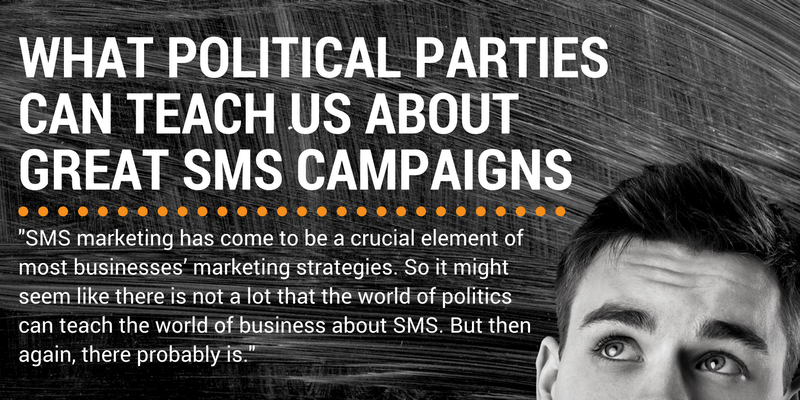What Political Parties Can Teach Us About Great SMS Campaigns

SMS marketing has come to be a crucial element of most businesses’ marketing strategies, and there is plenty of received wisdom within the marketing world as to how to get the most out of your SMS messages. So it might seem like there is not a lot that the world of politics can teach the world of business about SMS. But then again, there probably is.
Think of Barack Obama’s success in 2008, the UK’s dramatic 2015 General Election or the two big referendums we have been through in recent years. Each of these political campaigns had behind them a number of concerted SMS campaigns, with often incredible results. In fact, unnoticed by most of us, SMS has played a big part in quietly transforming our politics behind the scenes. And this quiet revolution has lessons for businesses large and small.
The core of a good political SMS campaign is nurturing a loyal and responsive support base. In the same way, a great business text messaging campaign often aims to elicit an immediate reaction from customers, a political SMS campaign can create greater responsiveness in a party’s support base. Supporters can be called to deliver messages, knock on doors or attend events faster and more instantaneously than ever before. There is a lesson here for those selling services in particular. But what is the key to building this underlying loyalty, whether to a brand or a political cause?
The answer can be again found in politics. The best calls to action here always start with the ‘why’, rather than the ‘what’. Local parties use this to great effect in the run-up to elections, with texts alerting supporters to activity in their area and pleas for action. These work because they always take the time (and space) to identify the ‘why’. A typical campaign text could read, “Polls are close & every vote counts! Protect our NHS – help get Name Surname elected…” and then go on to give activities, times and location. This works equally well for business SMS: consider “Not in the mood to cook? 25% off our delicious delivery menu tonight…” or “New colours in our beautiful autumn range – here’s £30 off…”
The importance of ‘why’ over ‘what’ is all about getting your customers (and your followers) to take action. This is a strategy that soon loses its fizz, however skilfully executed, without a loyal customer base. Here, again, the political world has a lot to teach us. Brand loyalty has many similarities to political allegiance or alignment with a cause – this, too, fundamentally rests on the ‘why’. Building loyalty is something parties have got very good at doing through SMS. The key here is letting your target audience in on something not available to the wider public: show them they’re in on something.
In an election campaign, this ‘something’ can vary. Messages like “We’ve just seen the new polling come through and it’s close…” or “Pre-announcement! Join us tomorrow for special policy speech…” give supporters of a party or politician a feeling of being part of something exciting. This is always based on shared values – as great marketing must also be based on shared values – and if a political campaign can use these shared values to build brand loyalty, businesses can too. Considering how to build brand loyalty using a similar sense of shared mission is a great way to generate powerful business SMS marketing.
There are a few very valuable lessons that political parties can teach us here. The first is the power of getting this message right. The second is the danger of getting it wrong. To take the potentially dangerous pitfall of a misjudged message first, you only have to imagine the trouble that political parties can (and do) get into when ‘call to action’ messages meant for committed campaigners end up in the public eye via social media or the press. From unfavourable descriptions of competitors to poorly judged remarks, a wise political HQ will judge each and every direct message they send out by how it would be received if it found itself thrust into the public eye. This is a problem advertisers and marketers are only too familiar with, from ‘insensitive’ messages to offers that offend. It never hurts to step back and ask how likely a message is to get you into trouble.
The flip side of the coin is the power of a well-aimed message. An appeal to customers’ values and beliefs can make a brand fly, as much through SMS as through email or traditional advertising. In fact, some of the most exciting new brands are so explicitly value-centred in their direct marketing, including SMS marketing, that their messages end up being as much about retaining loyalty and interest as about instantaneously prompting a sale. An SMS can often have a link to a web page, and poorly judged messages can come across as very spammy, so there tends to be either a positive or negative feedback loop: loyal customers will be more willing to receive texts inviting them to an exclusive event or giving them a product update; less interested ones will be more quickly irked by what they perceive to be spam.
Thus the most valuable lesson politics has to teach business about SMS marketing is the most fundamental. Strong campaigns succeed in judging the frequency and authenticity of their messages; they speak to their supporters’ values and they always make space for the ‘why’. This has reaped big rewards in getting supporters to engage more, and more readily, that they otherwise would. If it seems like a daunting task to take these lessons and apply them to marketing, it shouldn’t. After all, the toughest step is the one you should be taking anyway – making sure your brand is relevant, exciting and personal to your customers. If in doing so you can throw in a bit of insider political know-how, so much the better.
Related Articles
The New York Times, Olympics, And SMS Messaging
The New York Times used the Olympics as an excuse to try a massive SMS experiment. They wanted reporter Sam Manchester to get personal with their thousands of readers using two-way SMS messaging. Read the blog to see if the experiment was a success or a failure.
SMS Messaging for Artists and Performers
Independent artists and performers use many different methods to get people into their shows. Social media is a favourite, but SMS messaging can be even better. Learn how one performer used SMS messaging to sell out performances and how you can too.
Don’t Believe The Myth of The “Cashless Shopper”
Sometimes bloggers or journalists get a bit carried away. They see some data or fact, and run off to declare there’s a trend you need to know about. The latest one I’ve seen is all about how to reach the generation of “cashless shoppers”. The argument goes that you need to use SMS messaging to reach customers because they are all shopping online – where you obviously can’t pay in cash.
Why SMS is the Biggest Missed Opportunity for Marketing to Millennials
With the continued rise of different and more diverse technologies in the social and mobile web, it would be easy to dismiss the potential benefits of SMS marketing - and that’s exactly the reason you shouldn’t. An SMS is the unexpected visit of a familiar friend, and there’s one demographic that embraces an old trusted ally in this new, noisy digital world more than anyone else: the millennials.
Do Cinemas Need to Use SMS Messaging?
Every cinema experiences ups and downs in admissions. But do they have to wait for the next blockbuster to come along before seeing more ticket sales? Not if they use SMS messaging to connect with customers. Find out how in this blog.
Build Brand Loyalty with SMS Messaging
In a world where your competition can be found in just a few seconds, instilling brand loyalty in customers is a greater challenge than ever. One way to proactively reach out to customers is via SMS. The personal nature of SMS messages, combined with high read rates, gives you the opportunity to develop relationships with each customer.
Using SMS Messaging For a Cause is Catching On
As old as SMS messaging is (going on 25), is it surprising to know that for non-profits and political campaigns it’s just now catching on? It might be, but if you think about it maybe it isn’t surprising. Until the last few years, people have been very reticent to hand out their personal mobile number. Now though, they’re more willing – if they care about the source of the messages.
What Your Customers Want From SMS Marketing
Mobile marketing offers an unprecedented access to your customers virtually any time, anywhere. This is particularly true for SMS marketing because it is “always on”. Customers don’t have to be surfing the web, or using an app to receive messages. Instead, they see the marketing messages right alongside ones from their friends and family.
Oops! What to do When You Send the Wrong Message
Sending a text message to the wrong person can be embarrassing. I've done it many times. Thankfully though, they were just simple messages like "be home soon" or "I'll tell you later". Innocuous, harmless and easily explained away. But what if you make a mistake with your business SMS messages?
How Entertainment Venues Can Use SMS Marketing
Whether it's a cinema, theatre or concert hall, your entertainment venue is missing a trick if it's not utilising SMS marketing to get those bums on seats. We take an in-depth look at how all kinds of entertainment venues can really make the most of SMS marketing.












